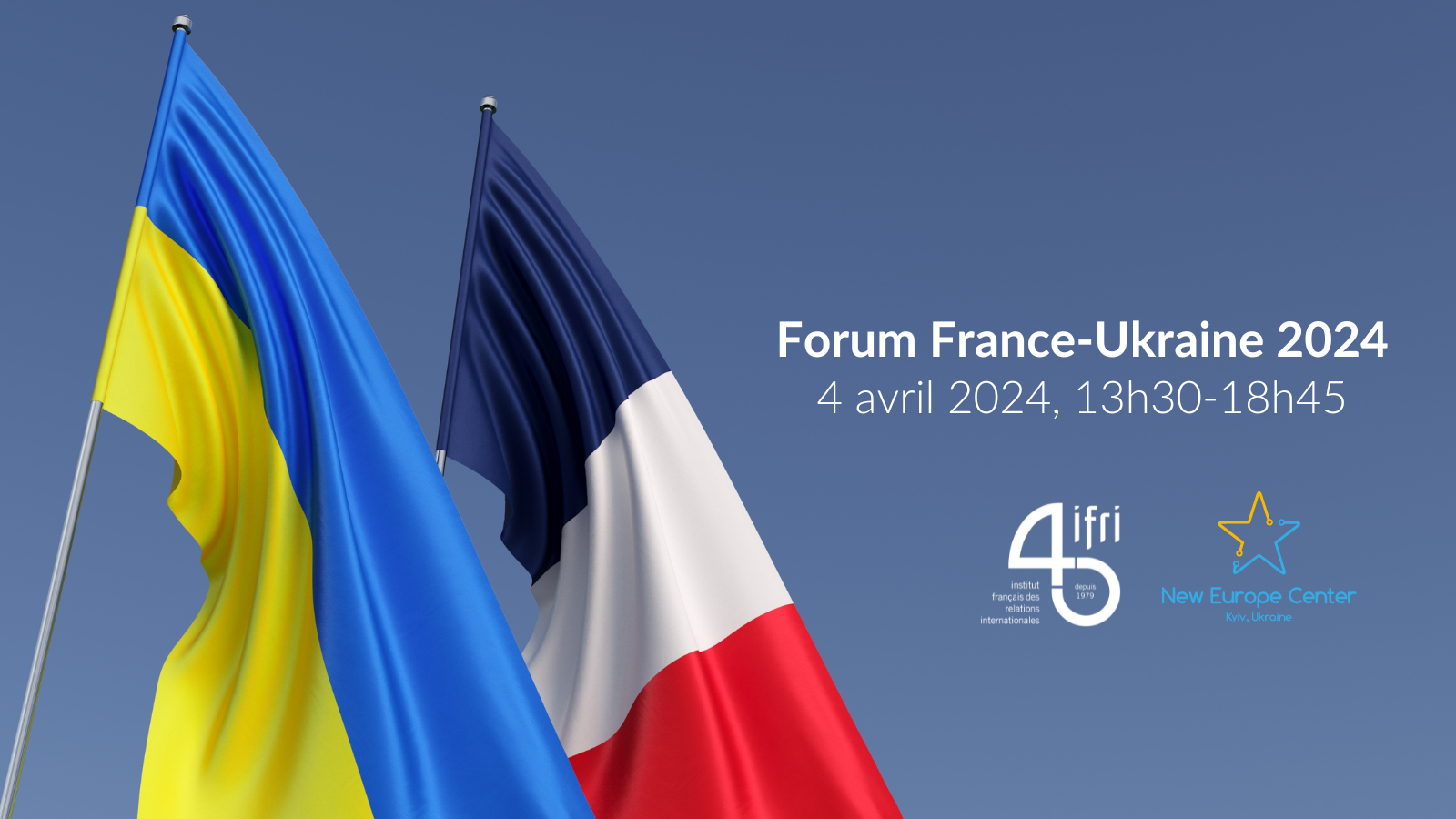
Practical information
Two years after the start of Russia's full-scale war against Ukraine, the France-Ukraine 2024 Forum will welcome politicians, experts, academics and members of associations from both countries.

13:00-13:30: Registration and welcome coffee
13.30-13:40: Introductory remarks by the organizers
Tatiana Kastouéva-Jean, Director, Russia/Eurasia Center, Ifri, France
Alyona Getmanchuk, Director, New Europe Center, Ukraine
13:40-14:15: Welcome address by Thomas Gomart, Director of Ifri,
followed by keynote speeches of the Ministers
Dmytro Kuleba, Minister of Foreign Affairs of Ukraine (online)
Jean-Noël Barrot, Minister Delegate for Europe, Ministry for Europe and Foreign Affairs of France (online)
14:15-15:30: How can the “war of attrition” be won by Ukraine?
Moderator: Dimitri Minic, Researcher, Russia/Eurasia Center, Ifri
Panelists:
- Brice Roquefeuil, Director for Continental Europe, Ministry for Europe and Foreign Affairs of France
- Rostyslav Ogryzko, Director of Europe division, Ministry of Foreign Affairs of Ukraine
- Pierre Haroche, French researcher on European security, Lecturer in International Relations & International Security, Queen Mary University of London.
- Mykhailo Gonchar, President, Centre for Global Studies “Strategy XXI”, Ukraine
- Olena Halushka, Member of the Board, Anticorruption Action Center (AntAC, Kyiv), co-founder of International Center for Ukraine Victory (ICUV)
15:30-16:00: Coffee break
16:00-17:15: Army, elites, society: can the “sacred union” be shattered?
Moderator: Tatiana Kastouéva-Jean, Head of the Russia/Eurasia Center, Ifri
Panelists:
- Olha Aivazovska, Head of the Board of the Civil Network OPORA NGO, Ukraine
- Ioulia Shukan, Lecturer in Slavic Studies, University of Paris Nanterre, Researcher, Institute for Political Social Science (ISP/CNRS)
- Hanna Hopko, Chair of the Board, ANTS NGO’s network, Ukraine
- Alexandra Goujon, Lecturer at the University of Burgundy and at Sciences Po-Paris
- Tetiana Ogarkova, Lecturer, Kyiv-Mohyla Academy, Head of International Department, Ukraine Crisis Media Center (UCMC), author of the podcast “L'Ukraine face à la guerre”
17:15-18:30: Big Euroatlantic deal for Ukraine: perspectives for the EU and NATO accession
Moderator: Leo Litra, Senior Research Fellow, New Europe Center
Panelists:
- David Cvach, Direction of European Union, Ministry for Europe and Foreign Affairs of France
- Oleksandr Sushko, Executive Director, International Renaissance Foundation
- Benjamin Haddad, President of the France-Ukraine Friendship Group at the French National Assembly
- Iryna Solonenko, Senior Fellow, Center for Liberal Modernity (LibMod)
- Marie Dumoulin, Director, Wider Europe program, European Council on Foreign Relations (ECFR)
18:30-18:45: Closing remarks:
Vadym Omelchenko, Ambassador Extraordinary and Plenipotentiary of Ukraine to France
Manuel Lafont Rapnouil, Head of Policy Planning, Ministry for Europe and Foreign Affairs of France
18:45-19:30: Cocktail at Ifri
The conference will be held in French and Ukrainian with simultaneous translation


In partnership with

For this event, New Europe Center is supported by International Renaissance Foundation.

Other events

Paris Naval Conference 2026: Naval Rearmament and Operations in Contested Waters
This fourth edition of the Paris Naval Conference (CNP), bringing together high-level military, industrial, and academic speakers, will address the challenges associated with general naval rearmament and naval operations in increasingly contested environments.





